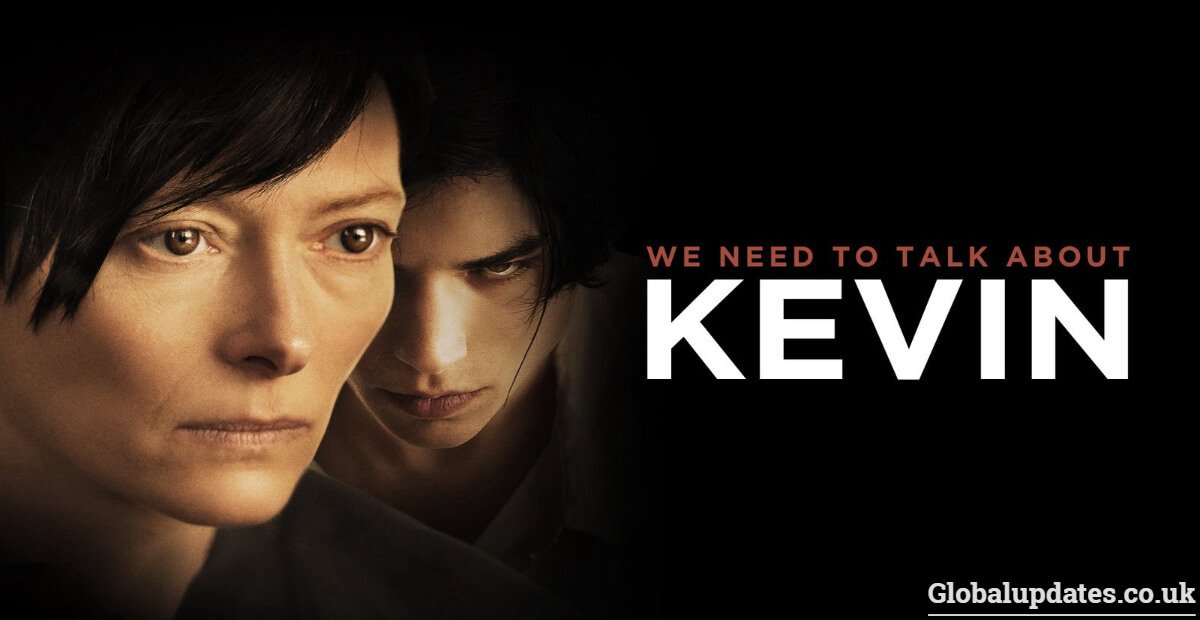We Need to Talk About Kevin is more than just a film; it’s an unsettling exploration of the complexities of family and the shadows that linger behind closed doors. Released in 2011, this psychological thriller continues to resonate with audiences today, sparking conversations about parenting, responsibility, and the often-taboo subjects surrounding violence. As viewers journey through its haunting narrative, they are left grappling with profound questions about human nature and societal influences.
This article will take you on a deep dive into the movie’s message. We’ll unravel its intricate themes and examine how each character contributes to our understanding of trauma and guilt. Whether you’re revisiting the film or watching it for the first time, prepare for a thought-provoking experience that lingers long after credits roll.
Plot Overview: Setting the Stage for a Deep Conversation
“We Need to Talk About Kevin” unfolds as a haunting exploration of familial bonds and the complexities of motherhood. The film centers around Eva, portrayed by Tilda Swinton, whose life spirals after giving birth to her son, Kevin.
Kevin is not your typical child. From an early age, his unsettling behavior hints at deeper issues. As he grows older, the tension between him and Eva becomes palpable. Their fraught relationship serves as a catalyst for the unfolding drama.
The narrative weaves through time, revealing pivotal moments that shape both their lives. It invites viewers into a world where love collides with fear and guilt. This intricate plot lays the groundwork for profound discussions about responsibility and moral dilemmas within family dynamics—setting the stage for serious conversations that linger long after viewing.
The Central Message of the Movie
At its core, “We Need to Talk About Kevin” grapples with profound themes that resonate deeply. The film intricately weaves the nature versus nurture debate into its narrative fabric. It raises questions about whether a child’s path is determined by genetics or shaped by their upbringing.
Parental responsibility looms large throughout the story. Eva’s struggles highlight the weight of expectations and guilt felt by mothers in particular. Her journey prompts viewers to reflect on how much influence parents truly have over their children’s choices.
The film also delves into trauma—both experienced and inflicted. It showcases how past experiences can echo through family dynamics, leading to devastating consequences. By tackling these heavy topics, it forces audiences to confront uncomfortable truths about violence and personal accountability within familial relationships. Each character serves as a mirror, reflecting our fears and vulnerabilities regarding parenting in an unpredictable world.
Must Read:
Kevin: The Complex Protagonist
Kevin embodies a profound complexity that captivates viewers. His character is more than just the villain; he serves as a mirror reflecting society’s anxieties about parenting and mental health.
From early childhood, Kevin exhibits troubling behavior, suggesting deep-seated issues. His interactions with his mother, Eva, reveal layers of manipulation and emotional detachment. This dynamic illustrates the struggle between love and resentment within familial relationships.
Psychologically, Kevin’s actions stem from an unresolved inner turmoil. He grapples with feelings of alienation and anger, which manifest in increasingly violent ways. Each incident pushes the narrative forward while inviting audiences to question how much responsibility lies with his upbringing versus inherent nature.
His chilling demeanor forces viewers to confront uncomfortable truths about empathy and accountability in parenting. Through Kevin’s lens, we explore the darker sides of human emotion—making him both a compelling antagonist and a tragic figure deserving deeper analysis.
Eva: The Mother’s Struggle and Guilt
Eva, portrayed with raw intensity, embodies the complexities of motherhood. From the outset, her struggle is palpable. She grapples with feelings of isolation and inadequacy as she navigates a world that often judges rather than understands.
Guilt looms over Eva like a shadow. Each decision she makes weighs heavily on her conscience. Did her actions contribute to Kevin’s darkness? This question reverberates throughout the film, haunting both her character and the audience.
The emotional toll of parenting Kevin is immense. Eva’s journey represents countless mothers who face similar challenges but may not find their stories told so poignantly. The tension between love and despair paints a vivid picture of maternal sacrifice amid turmoil.
Her relationship with Kevin reveals deeper truths about familial bonds and responsibilities in an increasingly complex world. Through Eva’s eyes, we witness not just a mother’s battle but also society’s struggle to comprehend troubled youth.
Cinematic Techniques: How the Film Communicates Its Message
The film “We Need to Talk About Kevin” masterfully employs cinematic techniques that deepen its unsettling narrative. The director, Lynne Ramsay, utilizes visual storytelling that is both haunting and beautiful. Each frame feels meticulously crafted to evoke a sense of dread and anticipation.
Music plays an essential role in shaping the atmosphere. The score enhances tension during pivotal moments, underscoring the emotional weight of Eva’s journey as she grapples with her son’s darkness.
Symbolism permeates throughout the film; from recurring motifs like color contrasts to imagery that reflects Eva’s internal struggles. The non-linear structure invites viewers into fragmented memories, creating disorientation akin to what Eva experiences herself.
The color palette further accentuates emotions—cold blues and stark whites juxtapose warmer tones found in moments of fleeting happiness, painting an evocative picture of isolation and turmoil. Each element reinforces the complex themes woven into this powerful narrative tapestry.
The Role of Violence in the Narrative
Violence in We Need to Talk About Kevin serves as a lens through which societal issues are magnified. The film doesn’t shy away from depicting the harsh realities of aggression and its aftermath. This approach forces audiences to confront uncomfortable truths about violence.
The school shooting, a pivotal moment in the narrative, is depicted with chilling restraint. It illustrates not just the act itself but also the ripple effects on families and communities. The emotional weight hangs heavily throughout, impacting how viewers perceive accountability.
Moreover, Kevin’s actions raise ethical questions about nature versus nurture. Are violent tendencies inherent or shaped by one’s environment? These complexities compel us to reflect deeply on our understanding of mental health and parental responsibility.
By presenting violence so starkly yet thoughtfully, the film invites an exploration of broader cultural conversations surrounding aggression in contemporary society.
The Aftermath: How the Movie Leaves Us to Reflect
The ending of “We Need to Talk About Kevin” resonates deeply, leaving viewers grappling with complex emotions. As the credits roll, questions linger about accountability and forgiveness.
Eva’s confrontation with her reality prompts us to ponder: Can a mother ever truly escape the shadow of her child’s actions? The film doesn’t provide easy answers; instead, it forces us to sit in discomfort.
Kevin’s fate evokes sympathy despite his heinous acts. This duality challenges our perceptions of good and evil within familial bonds.
As we reflect on the final scenes, we’re left questioning societal influences on violence and parental responsibility. The stark conclusion pushes audiences not just to observe but to introspectively examine their own beliefs about family dynamics and trauma. It’s this unsettling ambiguity that makes the film unforgettable—a haunting reminder of life’s complexities without clear resolutions or moral certainties.
Cultural and Societal Impact
The impact of We Need to Talk About Kevin movie resonates deeply in today’s cultural landscape. Critics praised its unflinching portrayal of difficult themes, sparking conversations about parenting and mental health.
Audiences often find themselves grappling with the film’s unsettling questions. It challenges conventional notions of motherhood and personal responsibility, leaving viewers reflecting on their own biases.
In contemporary discourse, the film serves as a critical lens for examining violence in society. The harrowing depiction of Kevin’s actions prompts discussions about societal influences on youth behavior.
Moreover, it highlights the stigma surrounding mental illness—a pressing issue that demands empathy rather than judgment. As more people engage with these topics, *We Need to Talk About Kevin remains relevant in fostering understanding and dialogue around complex familial dynamics and societal expectations.
Conclusion: Final Thoughts on the Message of the Movie
As we reflect on the intricate layers of “We Need to Talk About Kevin,” it becomes clear that the film serves as a powerful lens through which we can examine complex issues surrounding violence, parenting, and personal responsibility. The haunting narrative challenges us to confront uncomfortable truths about family dynamics and societal expectations.
The journey of Eva and Kevin invites viewers into their troubled world, prompting us to question our understanding of nature versus nurture. It pushes boundaries in discussing themes such as trauma, guilt, and accountability—elements that resonate deeply within many families today.
Each character’s struggle highlights the profound impact parental relationships have on child development. Through vivid storytelling techniques and a striking visual palette, the movie effectively communicates its unsettling messages without offering easy answers.
Watching “We Need to Talk About Kevin” is not just an exercise in entertainment; it’s an invitation for introspection. Engaging with its themes encourages conversations around mental health and societal norms that are often brushed aside or ignored.
For those willing to delve deeper into this thought-provoking narrative, it’s essential to approach the film with an open mind—ready to explore its complexities rather than merely observing from afar. Whether you’re familiar with these discussions or new to them altogether, there’s much wisdom waiting within this cinematic experience.
With all these elements combined, one emerges from watching “We Need to Talk About Kevin” not only reflecting on individual characters but also grappling with broader societal implications—all while acknowledging how vital it is for us as a community to engage in difficult dialogues regarding parenting and youth violence today.












































Got a Questions?
Find us on Socials or Contact us and we’ll get back to you as soon as possible.